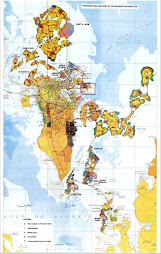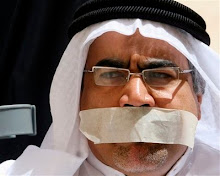Bahrain boom overshadowed by fear of looming war with Iran
By Donald Macintyre in Bahrain
Published: 02 November 2007
Stuck in one of the seemingly permanent traffic jams on the wide highways of its capital, Manama, where the colourful mosaic of the Friday Mosque's minaret competes for attention with the extraplanetarily futuristic twin towers of the World Trade Centre, you cannot easily imagine the shadow of war falling over Bahrain. But if there is a country in the region that has every reason to be apprehensive about a Western military confrontation with Iran it is the Arab world's only island state.It is not just that the Gulf kingdom is at once home to the US Fifth Fleet and nearer – 250km away – than Tehran is to the key Iranian nuclear reactor of Bashir. Or that war so near would threaten its national growth – thanks to oil, tourism, and financial services – of 7 per cent and a per capita income of $21,000 (£10,500). Or that the influential Iranian newspaper Kayhan in July carried the inflammatory claim that Bahrain was a "province" of Iran – requiring a hasty joint disavowal at a meeting of both countries' foreign ministers. Or that as recently as this week Bahrain's Gulf Daily News gave front-page prominence to a threat by a senior officer in the Iran Revolutionary Guard to launch suicide bombings in the Gulf "if necessary". There is also the potential impact on an already often restive Shia majority among the 750,000 population. At the end of a week in Britain in which the visiting King of Saudi Arabia, Bahrain's other immediate neighbour, has been castigated for the internally repressive regime he presides over, it is all the more striking that Bahrain's royal Al Khlaifa family has ushered in a – by Arab Middle East standards – progressive if so far severely limited experiment in parliamentary democracy . That experiment has seen 17 out of the 40 seats taken by Shia members of the Al Wifaq party in the parliament's elected lower house. Saudi businessmen regularly come over the causeway at weekends to savour the distinctly Western pleasures of alcohol and women available on the island. But few, if any, of the cautious steps instituted by King Hamad Bi Isa Al Khalifa towards his stated long term goal, however distant, of turning Bahrain into a "constitutional monarchy" has rubbed off on the Saudi regime. But this progress – which even moderate Shia MPs are increasingly complaining is far too slow to arrest what they and senior Western diplomats lament is still widespread discrimination by an overwhelmingly Sunni regime – is unlikely in the event of a war with Iran to contain a sectarian fallout, which in the blunt words of Bahrain's Foreign minister, Shaikh Khaled Al Khalifa, could eventually prove "worse than Iraq". Unsurprisingly, therefore, Bahrain would like some measure of influence over the Western deliberations on Iran. "I want to see the region being fully consulted," says Sheikh Salman, adding pointedly: "We were not fully consulted when the Iraqi regime was removed." This is not, he explains, because Bahrain wanted Saddam to remain in power; rather that a little of the "right advice" about which groups in Iraq to foster relations with might have led to a less catastrophic aftermath. "Iran is an even bigger issue," he suggests. "We want to be part of any arrangement that deals with Iran. We don't want to wake up one day and suddenly find our skies darken and sirens blaring on every street." This doesn't mean that Bahrain is unconcerned about what one high ranking – if anonymous – Bahraini official describes as "Iran's nuclear missile programme". It does mean, says the Crown Prince, Sheikh Salman Al Khalifa, a fresh diplomatic effort – not least by "garnering the support of the Russians" to reach, while there is still a "window of time", the negotiated solution that it is clear he strongly prefers to the "not advisable" course of a military strike. A senior official says even more bluntly that the US needs to withdraw "from the front line" and "get out of the way" in Iraq to focus on such diplomatic efforts over Iran. "The only reason the troops are [still] there is to save the face of the US administration," he adds. Internally, the threat of war can only exacerbate widespread impatience among the majority Shia both that they are failing to share in the distribution of Bahrain's wealth, and housing, and even more so that the lack of political progress since the last elections in 2006 are published – a major Al Wifaq complaint – it is impossible to give a reliable picture. Having been coaxed – not least by the US and Britain – to take part in those elections, Al Wifaq has warned that it is under pressure from harder line groups such as Al Haq which boycotted those elections to do so themselves next time unless there is further political progress. The powers of the Council of Representatives are greatly circumscribed and the King continues to appoint all ministers.As strikingly, the constituency boundaries are still drawn in a way to guarantee a Sunni majority in the Council of Representatives.A senior Western diplomat acknowledges that the "great expectations" of King Hamad in these areas has not so far been fulfilled and adds that while there has been a "huge amounts of positive change" the continued constituency gerrymandering of constituencies is "ridiculous". Despite frequent accusations that many Shia look to Iranian and Iraqi clerics for leadership – and much less bankable claims that they harbour Iranian-inspired "sleeper cells" – one diplomat also discounted the idea that the Shia of Bahrain are "willing agents and puppets of a malevolent Shia regime in Iran" rather than "loyal, patriotic, and looking after their own interests". That view is unsurprisingly shared by Dr Jassim who regards the moderate and non-fundamentalist ruling AKP party in Turkey as a model for his own. Nevertheless – like most of the (Sunni) Bahrain leadership he badly wants to see a negotiated solution to the Iranian crisis. "If there is an attack on Iran many people will see it as an attack on the Shia religious establishment," he says.
skip to main |
skip to sidebar

خارطة البحرين الجديدة
Facebook Badge
Followers
فسيلة السنكيس
متى ما ظهرت الفسيلة - الصغير من النخل- من فوق سطح الأرض، فمن حقها أن تنمو وان تعانق السماء دون حصار أو مضايقة أو استهداف
حق الفسيلة في الحياة كحق غيرها، من المخلوقات، خاصة وإن كانت دليل أصالة شعب كشعب البحرين
--------------------------------------------------------------
صاحب المدونة: د.عبدالجليل السنكيس
ناشط، كاتب وباحث أكاديمي من البحرين
البريد الإلكتروني: asingace@gmail.com
مدونة اخرى: http://alsingace.katib.org/
هاتف:8179-3966-973+
حق الفسيلة في الحياة كحق غيرها، من المخلوقات، خاصة وإن كانت دليل أصالة شعب كشعب البحرين
--------------------------------------------------------------
صاحب المدونة: د.عبدالجليل السنكيس
ناشط، كاتب وباحث أكاديمي من البحرين
البريد الإلكتروني: asingace@gmail.com
مدونة اخرى: http://alsingace.katib.org/
هاتف:8179-3966-973+
مواقع ووصلات ذات صلة Links of Interest
صور معبرة

خارطة البحرين الجديدة






